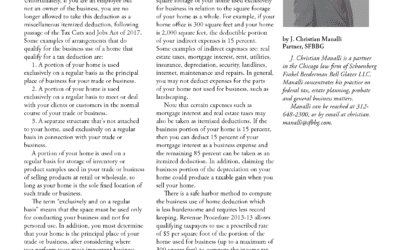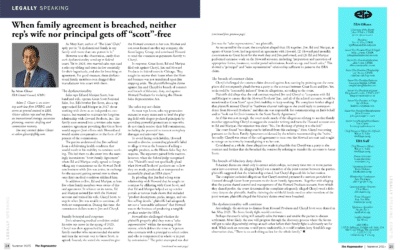Question: Given the possibility that the Federal estate tax exemption will decrease, should I make gifts now before the law changes?
Answer: Depending on the amount of the gifts you wish to make, a 2021 gift could provide an overall tax benefit. The general thinking seems to be that a gift designed to utilize some or all of a taxpayer’s current $11,700,000 estate tax exemption will only be beneficial if and to the extent the gift exceeds the future decreased estate tax exemption. It is believed that a gift in an amount no greater than the future exemption will not serve the purpose.
Assume Allison has $20,000,000 of assets in her estate. Further assume Allison makes a $5,000,000 gift of assets to her children in 2021 and that the per person Federal estate tax exemption decreases from $11,700,000 in 2021 to $6,000,000 in 2022. In this case, Allison’s 2021 gift will not have utilized any portion of the disappearing 2021 exemption because Allison’s $5,000,000 gift will be applied against the $6,000,000 exemption in effect in 2022 leaving Allison with $1,000,000 of exemption available for future gratuitous transfers, whether during her lifetime or upon her death. If instead, Allison makes gifts of $10,000,000 in 2021 and the exemption decreases to $6,000,000 in 2022, Allison will be deemed to have fully utilized her 2022 $6,000,000 exemption but will not be taxed on the $4,000,000 of gifts she made in 2021 that exceed the 2022 exemption. The bottom line is that to take advantage of the decreasing exemption, the 2021 gift should be more than the 2022 exemption, whatever amount that may be.
At this time, there is no definitive authority as to whether the estate tax exemption will be decreased as part of any new legislation, the amount, if any, that the decrease will be nor when any such decrease will take effect. Despite the uncertainty, many high-net worth individuals are making gifts to younger generation family members while the $11,700,000 historically high estate tax exemption is in place. The impetus for making taxable gifts under the current law is in large part based on the IRS position that any gifts made while the higher estate tax exemption is in effect will not retroactively be taxed if the exemption is lowered in future years.
Planning of course is difficult when there is no certainty as to what the new legislation will be. The talk from Capitol Hill is that the Federal estate tax exemption could be reduced to somewhere in the $5,000,000 to $6,000,000 range. Some proposals, however, are targeting a reduced exemption to an amount in the $1,000,000 range.
Taxpayers wishing to take advantage of the currently high exemption should also reconsider the conventional strategy of splitting gifts between spouses. Married couples have the choice of splitting gifts for tax purposes, regardless of which spouse makes a gift. In the example above, if Allison makes a $10,000,000 gift and she and her husband, Andrew, elect to split the gift for tax purposes, both Allison and Andrew will be deemed to have made a $5,000,000 gift for tax purposes. This means each spouse will have utilized $5,000,000 of the 2022 $6,000,000 exemption and will not have accomplished their objective of utilizing any of their disappearing 2021 exemptions. In this case, not splitting the gift yields a better result.
Other factors should be considered as well. While most States do not impose an estate tax, a minority of States do impose estate taxes and the ramifications of making lifetime gifts need to be considered from a State tax perspective. Moreover and as with any gifting strategy, income tax considerations should be factored into the equation. Currently the beneficiaries who inherit a decedent’s assets with substantial appreciation only pay capital gains taxes on post-mortem appreciation in these assets. If these same appreciated assets are transferred during lifetime by gift, beneficiaries will pay capital gains taxes based on the difference between the sale price and the donor’s original basis in those assets at the time they are gifted.
The Tax Corner addresses various tax, estate, asset protection and other business matters. Should you have any questions regarding the subject matter or if you have questions you want answered, you may contact Bruce at (312) 648-2300 or send an e-mail to [email protected].



